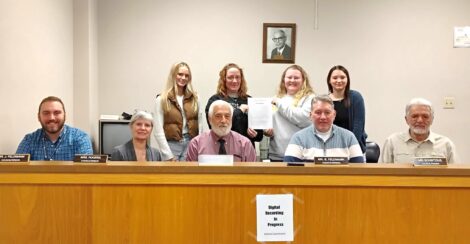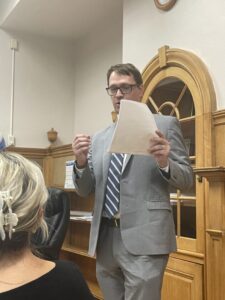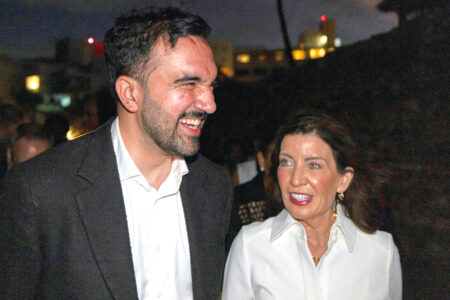SUNY faculty, leaders trade barbs

OBSERVER Photo by M.J. Stafford The sun sets behind SUNY Fredonia’s “Tin Men.”
A group of nine professors bashed SUNY Fredonia’s administration this week in a letter to the OBSERVER.
“We oppose our administration not because we are whiny faculty who balk at extra work for ourselves,” according to the letter. “Our administration is making decisions on the future of the university that will do significant harm. They protect themselves and have not made decisions in the best interests of the campus, community, nor students.”
Campus administrators, however, are responding to the accusations.
“What grew to a more than $15 million structural deficit in 2020 is today just $6 million thanks to actions we have taken in just the last two years,” SUNY Fredonia Stephen Kolison said in a response to the letter. “This administration is committed to making continued progress.”
The professors’ letter alleges that “in 2025 the management confidential employees (president, provost, vice presidents, deans, and others) received $124,071 in raises, while the campus drowns in debt and faculty and staff positions are being eliminated.
“At a faculty forum, the interim provost stated that every $50-60,000 the university saves helps to save a neighbor’s job. Apparently giving themselves raises is more important than two people’s jobs on campus. When she was asked about her salary at a student forum, she replied ‘Would anyone in this room work for free? No. I won’t either.’ When asked about faculty course releases being taken away, she said they’ll do it for the mentorship. The institution and students’ education never come first for this administration.”
Kolison responded: “For full perspective, from 2020 to 2025, the average salary increase for CSEA employees was 2.89%, for UUP employees it was 2.23%, for APSU employees it was 2.83%, and for management confidential (MC) employees it was 1.53%. (Management) employees were asked to forgo raises in four of the last six budget years.
“Also, in 2024, the president asked members of his cabinet to give back 0.5% to 1% of their salaries annually to support scholarships for students. They are the only group with this expectation as a part of their performance plan. In doing all of this, we believe we are striking the right balance between fiscal discipline and maintaining salaries that position Fredonia as an attractive regional employer and driver of economic opportunity.”
The professors’ letter notes that administrators can go back to their academic departments if their jobs are cut, but “when faculty and staff positions are cut, the individuals lose their jobs. For too long, the university has suffered from uninformed decision-making by administrators: they will talk about the decrease in the student/faculty ratio, but not address that we have more administrators than ever before, even with student numbers at their lowest in over 40 years.”
Kolison responded: “Administration is far from uninformed in their decision-making. Fredonia’s fiscal stability plan is based (and consistently updated) on the latest financial picture on a routine basis, in consultation with financial experts at SUNY. In addition, administration has regularly communicated, been transparent and collaborated with faculty and staff through the shared governance process to implement both growth and fiscal restraint strategies to address the structural budget deficit.”
As for the accusation about “more administrators than ever before,” Kolison said: “Fredonia had 21 management-confidential employees at the end of 2024-25 versus 20 in 2023-24. The one addition this past year was of a Chief Financial Officer — a key position to ensure we remain on track to a balanced budget. Even with that addition, we are at a lower number than several years ago.
“The fact is that over the last 10 years, while enrollment declined by 45%, total employment declined by 19%. As we continue to review positions across campus based on justifiable need, (management) positions are and will continue to be included as part of that review.”
The professors allege that Kolison “says he is looking at everything for budget cuts, yet he only considers cuts that impact faculty and staff, most of whom work with students and enhance the student experience. The cuts include secretarial, custodial and service staff who have suffered significant staffing reductions while the workload has increased, without additional compensation, for those who remain. When we recruit students, we highlight the close interactions between our students and faculty. The administration touts this, but is negatively impacting our ability to maintain them.”
Kolison said, “Fredonia’s financial sustainability plan is based on three pillars: (1) Growth, (2) Enhanced efficiency, and (3) Strategic reduction in expenditure. These three pillars are at work simultaneously in our efforts to eliminate the structural deficit in the next three years, and everyone across campus has a role to play in achieving these three pillars. To be clear, that means the administration is in fact part of shared fiscal discipline on campus.
“Common-sense budgetary actions include reviewing non-salary related spending to identify whether expenditures are mission critical across our entire campus, as well as seeking to eliminate duplicative costs. For example, the division of Finance and Administration has eliminated director-level positions, reduced service lines, and plans on absorbing the workload of retiring individuals. Stability is a shared exercise, and all parts of Fredonia must do their part — including administration.”
The letter concludes, “We do not have leadership by example: the administration’s actions show they are only concerned with themselves and satisfying whatever cuts SUNY wants. Their actions hurt our students and community. We are willing to work with others to support our students and the future of the university.”
The other professors who signed it were Natasha Farny, Neil Feit, Randolph Hohle, Paula Holcomb, Daniel Ihasz, Ted Lee, Leesa Rittelmann, Peter Tucker, and Susan Spangler.
Kolison concluded his response to the letter: “Administration’s concern is for the long-term financial stability and health of Fredonia, which is integral to delivering high-quality programs and services that students need and want. Fredonia is developing and implementing fiscal stability actions at a local level, not actions that are dictated by SUNY, because that is the most responsible thing to do. It is responsible from both a budgetary perspective and to ensure students continue to maintain access to the in-demand programs and services that put them on a pathway to lifelong success.
“The SUNY Fredonia administration has been transparent and direct about the budget issues, the deficit, and the work ahead for our campus. We have sought partnerships with our unions, University Senate, and Student Government Association. There is a place for all voices as we seek partnerships to move the campus forward. In the end, we must continue to take collective action to address the deficit and keep our campus vibrant and serving students for another 200 years.





